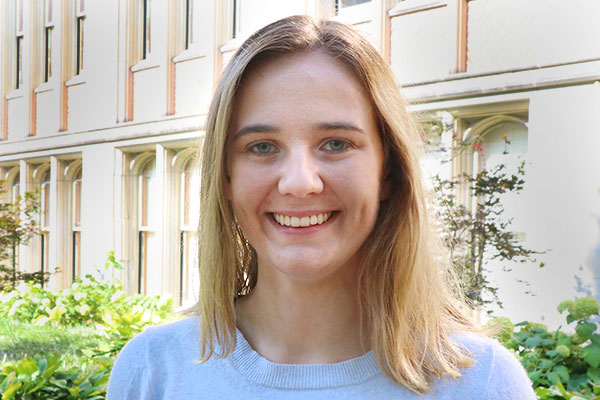Jacqueline Rogers
Energy, Environmental & Chemical Engineering
Degree pursuing: PhD in energy, environmental & chemical engineering
Hometown: New Jersey

Where did you complete your undergraduate degree?
Santa Clara University
Please provide your lab and description of research.
Agrochemical transformation reactions in the lab of Kimberly Parker. My research is focused on understanding what happens to herbicides used on genetically modified crops after they enter our environment. When agricultural pollutants like herbicides enter surface waters via agricultural run-off, these pollutants are carried by surface waters to drinking water treatment plants. In my work, I examine how different drinking water disinfectants, like chlorine and chloramine, alter the efficiency of herbicide removal and change the formation of potentially hazardous byproducts. To do this, I use analytical techniques including high-performance liquid chromatography (HPLC) and gas chromatography-mass spectrometry (GS-MS) to detect the compounds of interest.
What played into your decision to get a graduate engineering degree?
During my undergraduate career, I knew I enjoyed science, but I also knew that I was interested in applying science to modern-day environmental issues. Working towards a graduate degree in engineering allows me to conduct research that is focused on real-world environmental concerns. In my research, I have the opportunity to contribute to our understanding of the transformation of herbicides after they enter the environment. I specifically chose to pursue a graduate engineering degree in the Department of Energy, Environmental & Chemical Engineering because of the integrative approach to research that is encouraged. Having the opportunity to learn from faculty or fellow graduate students with different backgrounds has only enriched my experience.
Why did you pick WashU?
WashU's engineering graduate programs are well funded, which is an important factor in your success as a graduate student. Because of this, I can focus on research for the majority of my time here. Additionally, WashU's location is ideal in that it offers many of the amenities of living in a large city, but it’s also affordable to live here.
What was your favorite course and why?
My favorite course was Nanochemistry taught by Dr. Young-Shin Jun. This course focused on the current research in an upcoming field in chemistry. Its small class size lent itself well to having the time to have in-depth discussions regarding nano-chemical principles.
Who is your favorite instructor and why?
Dr. Jun has been my favorite instructor because of her willingness to help her students truly understand the material. Dr. Jun also encouraged her students to work on skill sets important to graduate students, like written and oral communication and proposal writing, in a productive manner.
What advice would you give to a new student?
Advice I would give to a new student would be to rely on your peers and your cohort. Classes and research can be challenging, and you will have a difficult exam or make mistakes. Everyone experiences these challenges and it is immensely helpful to get advice from people who have gone through it before you.
What is your favorite thing about St. Louis?
My favorite thing about St. Louis is the opportunity to participate in free activities around St. Louis. As a graduate student, having free and close activities helps you maintain a healthy work-life balance. Even during a busy day in the lab, you can take a quick 20-minute walk during your lunch break in Forest Park.
Are you presently in the workforce or have any work history? If yes, please describe.
I entered graduate school right after undergrad. However, I have completed internships with a water district during my undergraduate career in addition to working in research.
What are your plans for the future?
I am not yet certain of my career plans. However, I know I want to pursue a career that is involved in research, such as a faculty position or working in a national lab.
